Good morning!
Greetings in the name of the father, the Son, and the Holy Spirit.
“The fear of the Lord is the beginning of wisdom: and the knowledge of the Holy One is understanding.” (Proverbs 9:10)
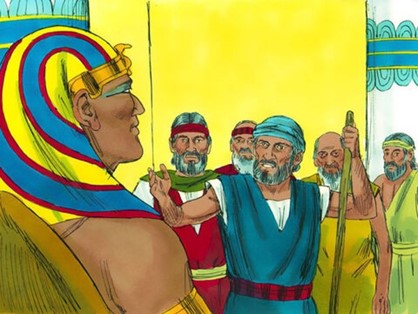
The king of Egypt, Pharaoh, was happy about his country, his people, especially the Israelites serving him and the rest of the Egyptians as enslaved people. He inherited from his father, the king of Egypt, the same title as Pharaoh. The word, Pharaoh, literally means a great house, which points to the massive palace where the king of Egypt lived. It also implies the great power over the people of Israelites enslaved to the Egyptians. The name, thus, suggests the pinnacle of power on earth because Egypt was the most powerful nation at that time. The world is still amazed at the Egyptians’ achievements, especially the Pyramids, one of the greatest wonders in human history. None of the civilizations on earth has ever built such massive and intricate structures with such precisions.
Pharaoh had about two million Egyptians and two million enslaved Israelites. He had approximately 1/7 of the entire world population, estimated at 27 million. Pharaoh was truly powerful, and his nation possessed surrounding countries technologically and military wise. No other countries could stand up against Pharaoh.
Internally, Pharaoh exercised his absolute power over his people and the Israelites’ slaves. All people living in Egypt worshiped him as a god. No one had ever challenged him.
However, one day, Pharaoh’s divine-like power was challenged by one unknown shepherd from a far remote area called Midian, where none in Egypt ever wanted to live in the area because it is a wildness and only good for wild animals. The unknown shepherd from Midian was Moses. Pharaoh had no idea why Moses suddenly challenged him, but God specially prepared Moses for this purpose for the last forty years.
Were the forty years easy for Moses? No. Moses could not count how many sleepless nights he had. He felt that the sky was falling. He only killed the Egyptian slave driver for his fellow Israelites who suffered in Egypt as slaves, not for his glory. Initially, Moses could not understand why. Moses asked why and why. How many times? Even Moses could not remember.
As dripping water can dig a hole in a rock on the rock, the forty years slowly and steadily changed Moses till he became a humble shepherd in the wilderness from the towering top former prince in Egypt. God’s carving on Moses was painful, and His hand was steady without ceasing. Why? God loved Moses. God needed a new Moses who was humble and obedient to God instead of relying on his wisdom, strength, knowledge, and skill. In the end, God created Moses 2.0, a humble, obedient, and faithful God’s servant shepherd out of Moses 1.0, who was the highly visible top Egyptian prince with superior skill and capability of leading the entire nation.
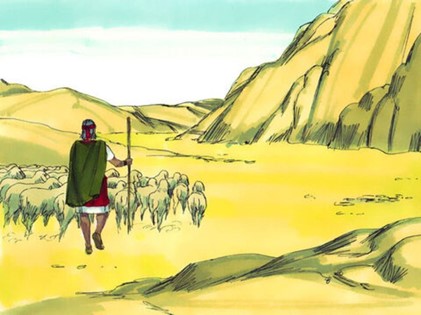
When Pharaoh met Moses 2.0, Moses looked like a humble shepherd coming from a remote place, but Moses challenged him while demanding freedom for the Israelites enslaved in Egypt. Moses’ demand was unacceptable.
To Pharaoh, the enslaved Israelites were the most precious possession that he could not give up. The Israelite slaves were essential for his country because they were the main engine that made the economy run by working for the Egyptians 24/7, 365 days. Pharaoh could not imagine Egypt without the two million Israelite slaves. The Israelite slaves were the major source of the power of his nation and himself.
So Pharaoh asked Moses, “Why can’t your people worship God in Egypt?” Then Pharaoh heard another bizarre argument from Moses. His God would kill them if they did not worship God after three days’ journey from Egypt. Logically speaking, their inability to worship God after three days’ journey not because of them but because of him. Then why would God punish them. Should God punish him not them?
Pharaoh was almost about to laugh, but Moses was very serious. Then Pharaoh kicked Moses and his companions out of his palace. Pharaoh called his officials and gave a harsh order — no more straws from now on, but the requirement of the number of bricks should be fulfilled as before, which was his punishment against Moses, who dared to ask for Israelites’ freedom with flawed logic. Pharaoh thought that his harsh treatment would stop Moses from coming back forever.
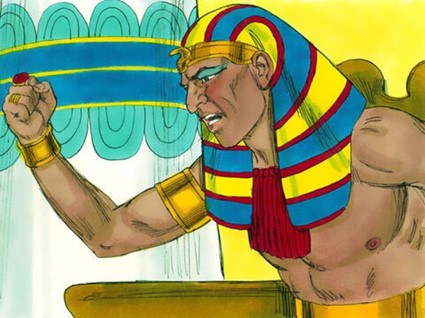
The harsh order gave a greater hardship to the Israelites. Thus, they sent leaders to Pharaoh to plea to remove the harsh order, but he affirmed his harsh order and expelled the leaders from his palace. As soon as the leaders came out of the palace, they directly went to Moses and made a huge complaint to Moses while hurling a curse.
“May the LORD judge and punish you for making us stink before Pharaoh and his officials. You have put a sword into their hands, an excuse to kill us!” (Exodus 5:21b)
Moses 1.0 would have gone back to the wilderness again, but Moses 2.0, trained by God for forty years, stayed. He clung to God. He poured out his heart to God as prayer. God heard Moses’ prayer. God then reaffirmed Moses’ role and explained why. God had made His solemn covenant with Abraham, Isaac, and Jacob. Then God promised Moses,
“Pay close attention to this. I will make you seem like God to Pharaoh.” (Exodus 7:1b)
Moses 2.0 was a completely different person from Moses 1.0. Pharaoh and his own people beat Moses, but Moses was resilient in faith. He stood firm in the power of God, which was never possible for Moses 1.0.
Pharaoh thought he had completely dealt with Moses, but Moses came back again to his surprise. For this time, Pharaoh was somewhat amused about Moses because Moses was not at the front but behind Aaron, who used to support Moses. Aaron performed cute magic by turning an ordinary-looking shepherd staff into a serpent. Then Aaron, not Moses, demanded the freedom of the Israelites. Pharaoh couldn’t believe what Aaron and Moses tried to do – convincing himself with the cute magic of God.
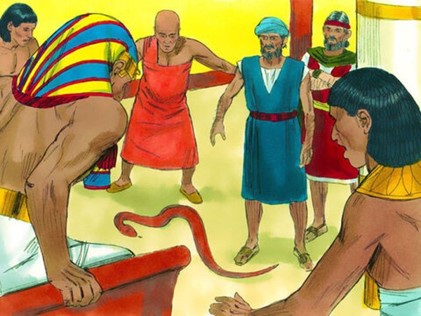
He knew it was one of the garden varieties of magic. Pharaoh saw before his magicians performed the same magic during festivals. He raised his hand and gave a sign. Not one but multiple magicians came quickly to him and performed the same magic. As a result, God’s serpent was surrounded by multiple serpents created by Pharaoh’s magicians. There was no reason to listen to Aaron anymore, although, in the end, Aaron’s serpent swallowed up all his magicians’ serpents. Pharaoh was not impressed by God’s power. He ordered to kick out Aaron and Moses. It was yet another ridiculous session. Why did they demand their freedom while telling God’s name? God Himself was not so powerful. His power was at most par with that of his magicians.
Not a long time later, Moses and Aaron came back to Pharaoh. Pharaoh was impressed by their persistency. Pharaoh let them talk again. But what he heard was yet another ridiculous demand. Pharaoh kept watching Moses, who was leading Aaron for this time. Moses ordered Aaron to raise the same staff and strike the water of the Nile. Suddenly, the whole river turned to blood. It was impressive, but Pharaoh knew his magicians could do the same.
To mock God, whom Moses and Aaron dearly believed, He called his magician, and they performed the same magic. Pharaoh proved again God was not so powerful as Moses and Aaron believed. However, Pharaoh was somewhat concerned about the entire Nile water becoming blood, and his people couldn’t drink it. He pondered which was a better course of action – releasing the Israelites or keeping them as slaves. He figured out that freshwater would eventually flow in and replace the blood water. It was a matter of time, which was a small pain he had to pay because his people could not drink the Nile water for a while. But if he sent away the Israelites, who would keep the entire nation’s economy going? His officials also informed that Egyptians dug along the riverbank and got drinking water. Pharaoh figured out his country was still safe, and the Israelite slaves still had to work for him. Pharaoh decided not to release the Israelites. He felt he was a wise king after all.
As expected, the Nile River returned to normal shortly after the Nile incident, and everything was back to normal again. Pharaoh thought that he won, and Moses would not come back again because, yet again, God was proved to be not so powerful as Moses believed. After all, Pharaoh was right again for his nation and his Egyptians, and he felt good.
On the other hand, Moses remembered what God told Moses about Pharaoh who would harden his heart and refuse to send away the Israelites. It did not make sense to Moses why did God let Pharaoh’s heart harden. But Moses kept believing in God. Moses 2.0 learned how to be humble and obedient to God.
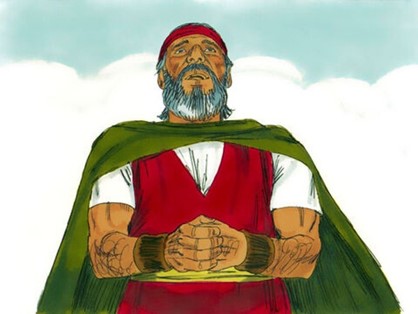
And it is impossible to please God without faith. Anyone who wants to come to him must believe that God exists and that he rewards those who sincerely seek him. (Hebrews 11:6)
Pharaoh was wrong. Moses came back. Indeed, it was not Moses, but God who made Moses kept coming back to Pharaoh. Who would challenge Pharaoh again and again, who had a god-like power in Egypt? Pharaoh could put anyone to death. Moses knew this, but he went back again and again because God commanded him to do so. Moses’ faith pleased God.
Pharaoh saw Moses again, which surprised him. If he were Moses, he would never return to Pharaoh because he witnessed that God’s power was not greater than that of Pharaoh’s magicians. It was not strong enough to convince Pharaoh to release the Israelite slaves listening to God’s command. For this time, Pharaoh was rather curious about Moses and why Moses kept coming back.
Pharaoh again let Moses speak, but he heard the same ridiculous demand. He saw Moses who told Aaron, ‘Raise the staff in your hand over all the rivers, canals, and ponds of Egypt, and bring up frogs over all the land.’” So Aaron raised his hand over the waters of Egypt, and frogs came up and covered the whole land! Pharaoh did not doubt that the magicians could not do the same thing with their magic. Pharaoh called for his magician, and they, too, caused frogs to come upon the land of Egypt. However, it was a couple of flogs. The flogs brought by Moses were countless, which were everywhere in bedrooms, beds, houses, ovens, and kneading bowls. Pharaoh finally realized God’s power is greater. Pharaoh summoned Moses and begged,
“Plead with the LORD to take the frogs away from me and my people. I will let your people go, so they can offer sacrifices to the LORD.” (Exodus 8:8b)
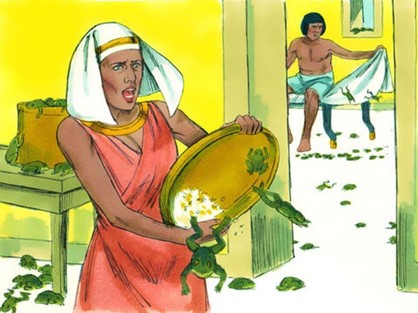
“All right,” Moses replied, “it will be as you have said. Then you will know that there is no one like the LORD our God. The frogs will leave you and your houses, your officials, and your people. They will remain only in the Nile River.”
Pharaoh saw Moses who cried out to God about the frogs God had inflicted on him. As Moses prayed, God did as Moses prayed. Finally, Pharaoh saw God’s power. But Pharaoh again gave thought whether he would release the Israelite slaves or not. The pain caused by the frog plague was not so bad after all. Pharaoh said to himself, “I would continue my course, not releasing the Israelite slaves because I would lose much more than the small pain we experienced.” Then Pharaoh did not keep what he said by hardening his heart.
But, after the frog plague, Pharaoh knew Moses would come back again. As expected, Moses came back and demanded the same. Pharaoh watched Moses, who brought a plague of gnats. The Pharaoh asked his magicians to do the same magic, but they could not. Instead, the gnats covered them, and they shouted,
“This is the finger of God!’ (Exodus 8:19a)
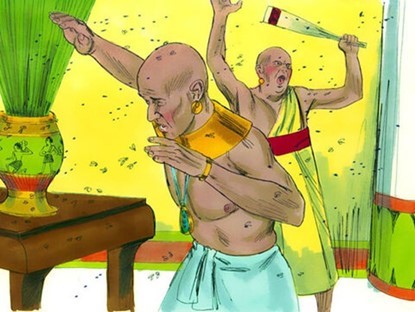
Pharaoh again contemplated releasing the Israelite slaves, but the plague was just gnats, which was just a nuisance. His answer to Moses was no, but he knew Moses would come back very soon.
Following morning, Pharaoh went down to the Nile River. Moses blocked his way and demanded the same. So far, Pharaoh knew the plague fell upon the Egyptians and the Israelites. Thus, both suffered equally. He reasoned, “If God were for the Israelites, why did God bring the plagues equally to his Egyptians and God’s Israelites?” Then he concluded that God had limited power over his own plagues. He could not precisely control his plagues to distinguish His people, the Israelites, from the Egyptians. This train of thought comforted him.
Pharaoh let Moses make the demand again and waited for the next plague that Moses would bring. But for this time, Moses said,
“The Egyptian homes will be filled with flies, and the ground will be covered with them. But this time I will spare the region of Goshen, where my people live. No flies will be found there. (Exodus 8:21b-22a)
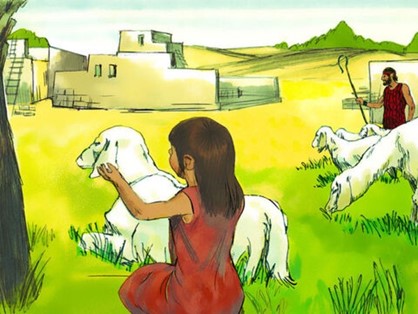
Pharaoh thought, “What? God would only send flies to the Egyptians, not the Israelites. It would be cool if God could do. I have never seen it so far. Let’s see whether God really could do as Moses talked about.”
However, Pharaoh was more bothered by the later part of Moses’ saying,
“Then you will know that I am the LORD and that I am present even in the heart of your land. (Exodus 8:22b)
The following day, all things happened, as Moses said. Pharaoh realized God’s power was unlimited. God could do anything that He desired. God sent His plague only to the Egyptian while not touching the Israelites. Pharaoh then decided to negotiate with Moses for this time. Pharaoh called for Moses.
“All right! Go ahead and offer sacrifices to your God,” he said. “But do it here in this land.” (Exodus 8:25)
But Moses replied, “We must take a three-day trip into the wilderness to offer sacrifices to the LORD our God, just as he has commanded us.” (Exodus 8:27)
The negotiation did not go as Pharaoh wanted. Then Pharaoh responded,
“All right, go ahead. I will let you go into the wilderness to offer sacrifices to the LORD your God. But don’t go too far away. Now hurry and pray for me.” (Exodus 8:28)
By that time, Pharaoh knew Moses was the only one who could stop the fly plague by praying to God. God was truly impressive. He could selectively bring down his plague to the Egyptians only, which made Pharaoh fearful about God. Moses prayed to God, and soon his fear of God left too because he saw not a single fly remained. Pharaoh again reasoned the consequences of losing all Israelite slaves vs suffering for a while due to God’s plague. To stop God’s plague, Pharaoh also found that he had to just cox Moses to pray to God. So far, it worked.
Pharaoh asked himself, “What’s the logical and good decision for his country?” He kept pondering over two choices, and gave deep thoughts, “No one knows tomorrow. Why do I worry about something that I don’t know? I am ok today with all that I have and this mighty nation with the two million slaves. Why do I bother to send away the most precious asset that our nation owns? Yes, I should keep my slaves. For the worst case, Moses will bring down God’s plague, and I will suffer again with the rest of the Egyptians. Also, I had never seen any plagues persist for a long time. As looking back, the blood plague disappeared by itself. The gnats plague also disappeared by itself. So far, I have had to deal with Moses twice to remove the plagues of frogs and flies. I see the pattern: half and half chance. Using this pattern, I can predict my future. I will need to negotiate with Moses to remove God’s plague with a half-and-half chance. That’s it. The rest half will be gone by itself. I am a smart and good king for this country. We absolutely need the Israelite slaves to sustain our huge economy, the biggest on the earth.”
Pharaoh hardened his heart and did not let the Israelites go as God predicted. What’s the main reason why Pharaoh didn’t release the Israelites? God answered Moses. The reason is to make who God was to all the nations, including Egypt and Pharaoh.
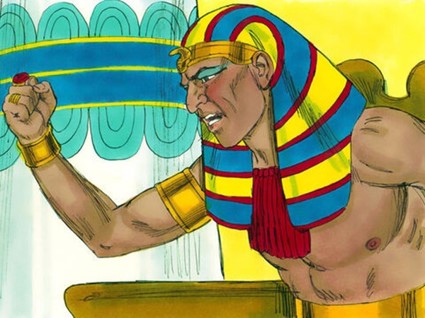
“Then you will know that I am the LORD and that I am present even in the heart of your land. (Exodus 8:22b)
Nobody is more powerful than God, or wiser than God. Pharaoh reached a logical conclusion using all kinds of human wisdom, past histories, and mathematical projection by applying probabilistic reasoning. It was mere Pharaoh’s desperation before God and an attempt to cling to his earthly power and wealth. Pharaoh kept going against God’s will although Moses told the reason why God brought the plague, and he became stubborn after each plague. The very reason was to let the whole world know who God was. Pharaoh heard the message through Moses, but Pharaoh could not pick up the true message because he kept relying on his earthly wisdom. Pharaoh’s goal was to maximize his earthly power and wealth without knowing he was a part of God’s plan and he was used to glorifying God.
God is the most powerful and wisest God of all, and most importantly, God is infinitely faithful to His people by keeping His covenant under all circumstances. God is not a mere mortal, but He is Our Ever-Loving Father, one and the only Omnipotent God ruling over every power, thought, plan, and act. We all glory Him and praise His name now and forever.
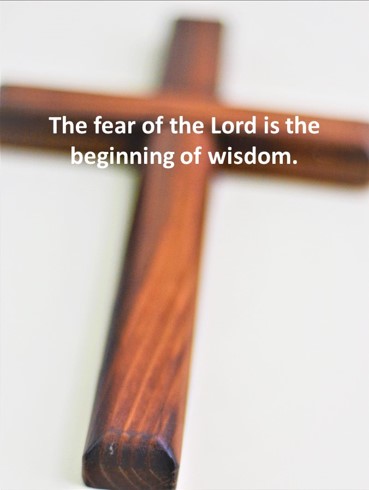
A man’s heart plans his course, but the LORD determines his steps. (Proverbs 16:9)
